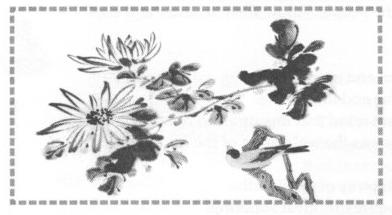
在中國古代詩人中,也有一些人對人生感到徬徨困惑,找不到一條生路。陶淵明雖然也徬徨也困惑,可是他這個人生之所以了不起,是因為他沒有停留在徬徨困惑之中,而是找到了一個立足點,找到了一條他自己要走的路。
這第四首詩所寫的,就是他擺脫了徬徨困惑,找到自己安身立命之所在的這樣一個過程。這段過程,他不是只用敘述來說明,而是用一個形象來表現的。這個形象就是一隻鳥。在陶詩中,最常用的形象有松樹、菊花、鳥。一般說起來,陶淵明在用松樹和菊花的形象時,象徵的含義是比較固定的。松和菊都是耐寒的植物,它們能夠抵抗寒冷的風霜,保持自己的品格。
但陶淵明在用鳥的形象時,往往有不同的含義。比如他說:「久在樊籬裏」(歸田園居五首之一),那是一隻被關在籠子裹不自由的鳥,它被世界上很多事情所約束限制;他說:「望雲慚高鳥。(始作鎮軍參軍經曲阿),那是一隻高飛的代表自由的鳥,它不受人世間種種事情的限制約束;他說:「飛鳥相與還」(飲酒二十首之五),那是一隻找到歸宿的鳥,正在飛回巢中。
而且陶淵明所用的鳥的形象,到底是哪一種鳥?是燕子、喜鵲,還是烏鴉、麻雀?他都沒有說。那是一種普通的概念中的鳥,而不是現實中特定的 某一隻鳥。這也是陶詩中鳥的形象的一個特色。
那麼陶淵明在這首詩中所說的鳥是一隻什麼樣的鳥呢?是「栖栖失群鳥」。一個人寫詩寫得好,一定是他通過文字傳達情意傳達得好。而文字能否傳達好你的情意,首先在於你能否選擇最適當的名詞、動詞和形容詞,其次在於你敘述的口吻。現在陶淵明用了一個形容詞來形容這隻鳥,他說它是一隻「栖栖」的失群鳥。這兩個字用得非常妙。一般中國的讀書人,看到「栖栖」這兩個字,最容易聯想到的就是論語裏的一句話:「丘何為是栖栖者與?」《論語•憲問》
這是微生畝問孔子的話。微生畝是一個不肯出來做官的高隱之士。
大家知道,儒家的理想是「學而優則仕」,讀書讀得好,出來做官。因為讀書是為明白道理,明理後有了很好的品德修養,就可以齊家、治國、平天下。儒家讀書修身就是為了治國平天下的。尤其是孔子所生的那個時代,社會上禮崩樂壞,出現了許多不道德的事情。
孔子周遊各國,不是遊山玩水,而是要看各國的君主有沒有人肯任用他,肯幫助他實現他的政治理想。因此他總是在各國之間跑來跑去。「栖」這個字讀「西」,不讀 「七」。我們常說「 栖栖惶惶」,意思是匆忙的,不安定的。
微生畝是高隱之士,他只要自己生活安定就好了,至於國家和天下怎麼樣,他不管。所以他很不贊成孔子的作為,就問孔子:「你為什麼老是栖栖惶惶的這麼不安定呢? 」這是陶淵明很妙的一點。他寫的是一隻孤獨失群之鳥,可是他所用的形容詞卻是《論語》裏邊用來描寫孔子的形容詞。因此這隻鳥形象上就有了深刻的意思,馬上就被擬人化了。而且「失群」這兩個字他用得也很好。失群是脫離了它原來所歸屬的那個群體,因此就顯得與眾不同。
我在開始介紹陶淵明生平的時候,曾說過陶淵明是陶侃的後代。陶侃是東晉名臣,封長沙郡公,所以陶淵明的家庭是一個仕宦的世家,這種家庭的子弟一般都是走讀書和做官的道路。大家都知道,陶淵明最後是辭官回家去種田了。他和別的隱士不一樣,比如唐朝的王維;王維也隱居了,可是他到田裏去勞動過嗎?他體驗過真正的勞苦生活嗎?他從來也沒有。
待續 |
|
There were some ancient Chinese poets who were confused and uncertain about life and never managed to find a clear way out of their confusion. Tao Yuanming was also confused and uncertain, but what made him outstanding was that he did not remain that way, but found a place to establish himself and a path to walk.
His fourth poem describes the process of getting over the confusion and uncertainty, and sorting out his own life. He not only describes this process, but uses the metaphor of a bird. The most common used metaphors in his poems are pine trees, chrysanthemums, and birds. Generally, when Tao Yuanming used pine trees and chrysanthemums as metaphors, they had relatively fixed symbolic meanings. Both pine trees and chrysanthemums can withstand the cold wind and frost, and preserve their own characteristics.
However, Tao Yuanming used birds in various metaphorical ways. For example, his line, "Long confined to a cage" (from one of the five poems of "The Return") describes a caged bird lacking freedom, bound and constrained by numerous worldly affairs. The line, "Gazing at the clouds, the high-flying bird feels ashamed" (from "On Passing through Qu-Ah Shortly After Being Appointed as a Military Counselor") refers to a bird soaring freely in the sky, not bound or limited by worldly things. His line, "Birds fly home in groups" (in the fifth poem of "On Drinking") describes birds finding their way back home.
What kind of the bird did Tao Yuanming use in his metaphors? Was it a swallow, a magpie, a crow or a sparrow? Actually, he did not specify. He used the idea of a bird in general and did not specify a particular type of bird. This is also a characteristic of the bird metaphor in Tao's poems.
Now, what is the bird in this poem like? It is "a distressed bird, strayed from the flock." A good poet is adept at using language to express sentiments. Whether words truly convey sentiments depends first of all on whether one chooses the most suitable nouns, verbs and adjectives; second of all, on one's descriptive phrasing. Here, Tao Yuanming used an adjective to describe this bird. He said that it is a 'distressed' bird that has strayed from its flock. This is a marvelous usage of this word. Most educated Chinese people, upon reading xi xi, the characters for 'distressed,' think immediately of a sentence in the Analects of Confucius: "Why are you, Qiu, so distressed?" (Xian Wen, Analects.)
This is a question that Weisheng Mu , a lofty hermit who refused to work for the government, asked Confucius.
We all know that the Confucian ideal is "to seek an education, and then serve as an official" - to study well, and then work as an official. The purpose of study is to understand the principles. After studying and understanding the principles, one will have integrity and a refined character, enabling one to manage the family, govern the country, and bring peace to the world. A Confucian pursues an education and cultivates virtue in order to govern the country and bring peace to the world. During the time of Confucius, the ancient rites and music had been forgotten and neglected, and many immoral incidents occurred.
Confucius traveled among the feudal states, not sightseeing, but looking for a feudal ruler who would appoint him and help him carry out his political ideals. Therefore, he always travelled from one state to the next. The character 栖 for 'distressed' should be pronounced xi, not qi. We often say 栖栖惶惶xi xi huang huang which means hasty and unsettled. Weisheng Mu was a lofty hermit, who was content with his own peaceful life and did not concern himself with the affairs of the country or world. Therefore, he did not agree with what Confucius was doing and asked, "Why are you always so hasty and unsettled?" This is what makes Tao Yuanming marvelous. In writing about a lonely bird strayed from its flock, he chose an adjective that was used to describe Confucius in the Analects. Thus, the image of the bird carries a profound meaning and immediately becomes personified. Besides that, Tao makes excellent use of the word 'distressed'. 'Strayed' means it has become separated from its flock, so it stands out from the crowd.
When I introduced Tao Yuanming's life story, I mentioned that he was the son of Tao Kan, a famous minister of the Eastern Jin Dynasty who was appointed the Duke of Changsha. Therefore, Tao Yuanming came from the family of a government official. The children of such families would generally pursue an education and become officials themselves. Yet, we all know that Tao Yuanming finally quit his government job and returned home to take up farming. He differed from other hermits, such as Wang Wei of the Tang Dynasty. Wang Wei also went into seclusion, but did he ever work in the fields? Did he ever experience a life of hard labor? No, he never did.
To be continued |